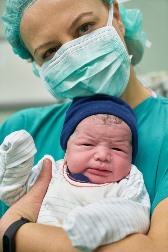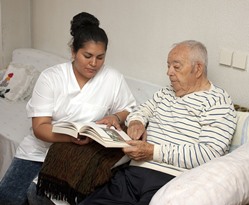How to Choose the Right LPN College near Mesa Colorado
 There are principally two scholastic credentials available that provide instruction to become an LPN near Mesa CO. The one that can be concluded in the shortest time period, typically about twelve months, is the certificate or diploma course. The 2nd alternative is to obtain a Practical Nursing Associate Degree. These LPN programs are more comprehensive in nature than the diploma option and normally require 2 years to complete. The benefit of Associate Degrees, aside from providing a higher credential and more in-depth instruction, are that they furnish more transferable credit toward a Bachelor’s Degree in nursing. No matter the kind of credential you pursue, it needs to be state approved and accredited by the National League for Nursing Accrediting Commission (NLNAC) or another national accrediting organization. The NLNAC attests that the course of study effectively prepares students to become Practical Nurses, and that most graduates pass the 50 state required NCLEX-PN licensing exam.
There are principally two scholastic credentials available that provide instruction to become an LPN near Mesa CO. The one that can be concluded in the shortest time period, typically about twelve months, is the certificate or diploma course. The 2nd alternative is to obtain a Practical Nursing Associate Degree. These LPN programs are more comprehensive in nature than the diploma option and normally require 2 years to complete. The benefit of Associate Degrees, aside from providing a higher credential and more in-depth instruction, are that they furnish more transferable credit toward a Bachelor’s Degree in nursing. No matter the kind of credential you pursue, it needs to be state approved and accredited by the National League for Nursing Accrediting Commission (NLNAC) or another national accrediting organization. The NLNAC attests that the course of study effectively prepares students to become Practical Nurses, and that most graduates pass the 50 state required NCLEX-PN licensing exam.
What is an LPN?
 Licensed Practical Nurses have many functions that they carry out in the Mesa CO medical facilities where they are employed. As their titles imply, they are mandated to be licensed in all states, including Colorado. While they may be accountable for overseeing Certified Nursing Assistants (CNA), they themselves normally work under the oversight of either an RN or a doctor. The health care facilities where they work are numerous and diverse, such as hospitals, medical clinics, schools, and long-term care facilities. Anywhere that you can find patients requiring medical treatment is their dominion. Each state not only oversees their licensing, but also what functions an LPN can and can’t perform. So depending on the state, their daily work functions might include:
Licensed Practical Nurses have many functions that they carry out in the Mesa CO medical facilities where they are employed. As their titles imply, they are mandated to be licensed in all states, including Colorado. While they may be accountable for overseeing Certified Nursing Assistants (CNA), they themselves normally work under the oversight of either an RN or a doctor. The health care facilities where they work are numerous and diverse, such as hospitals, medical clinics, schools, and long-term care facilities. Anywhere that you can find patients requiring medical treatment is their dominion. Each state not only oversees their licensing, but also what functions an LPN can and can’t perform. So depending on the state, their daily work functions might include:
- Taking vital signs
- Providing medicines
- Initiating IV drips
- Overseeing patients
- Taking blood or urine samples
- Maintaining patient records
- Assisting physicians or RNs with procedures
Along with their work duties being governed by each state, the health care facilities or other Mesa CO healthcare providers where LPNs work can further limit their job roles within those parameters. Additionally, they can work in various specialties of nursing, for instance long-term care, critical care, oncology and cardiology.
LPN Programs Online
 Enrolling in LPN programs online is growing into a more favored way to get training and attain a nursing certificate or degree in Mesa CO. Some schools will require attending on campus for a component of the training, and almost all programs call for a specific amount of clinical rotation hours performed in a local healthcare center. But since the balance of the training can be accessed online, this method may be a more convenient solution to finding the free time to attend college for some students. Concerning tuition, many online degree programs are less expensive than other on campus alternatives. Even supplementary expenses such as for commuting and study materials can be reduced, helping to make education more affordable. And many online programs are accredited by U.S. Department of Education recognized organizations. And so if your job and family obligations have left you with limited time to work toward your academic goals, maybe an online LPN school will make it more convenient to fit a degree into your busy schedule.
Enrolling in LPN programs online is growing into a more favored way to get training and attain a nursing certificate or degree in Mesa CO. Some schools will require attending on campus for a component of the training, and almost all programs call for a specific amount of clinical rotation hours performed in a local healthcare center. But since the balance of the training can be accessed online, this method may be a more convenient solution to finding the free time to attend college for some students. Concerning tuition, many online degree programs are less expensive than other on campus alternatives. Even supplementary expenses such as for commuting and study materials can be reduced, helping to make education more affordable. And many online programs are accredited by U.S. Department of Education recognized organizations. And so if your job and family obligations have left you with limited time to work toward your academic goals, maybe an online LPN school will make it more convenient to fit a degree into your busy schedule.
LPN Salary
According to the Bureau of Labor Statistics, the median annual wage for Licensed Practical Nurses (LPN) was $45,030 in May 2017. The median wage is the wage at which half the workers in an occupation earned more than that amount and half earned less. The lowest 10 percent earned less than $32,970, and the highest 10 percent earned more than $61,030. Most licensed practical nurses near Mesa CO work full time, although about 1 in 5 worked part time in 2016. Many work nights, weekends, and holidays, because medical care takes place at all hours. They may be required to work shifts of longer than 8 hours. Employment of LPNs is projected to grow 12 percent from 2016 to 2026. Job prospects should be favorable for LPNs who are willing to work in rural and medically under served areas.
Things to Ask LPN Schools
 Once you have decided on obtaining your LPN certificate, as well as if you will attend classes on campus or on the internet, you can use the following guidelines to begin narrowing down your choices. As you no doubt are aware, there are a large number of nursing schools and colleges near Mesa CO as well as within Colorado and throughout the United States. So it is essential to lower the number of schools to select from so that you will have a manageable list. As we earlier mentioned, the site of the school and the cost of tuition are most likely going to be the first two things that you will consider. But as we also emphasized, they should not be your sole qualifiers. So prior to making your final choice, use the following questions to evaluate how your pick compares to the other programs.
Once you have decided on obtaining your LPN certificate, as well as if you will attend classes on campus or on the internet, you can use the following guidelines to begin narrowing down your choices. As you no doubt are aware, there are a large number of nursing schools and colleges near Mesa CO as well as within Colorado and throughout the United States. So it is essential to lower the number of schools to select from so that you will have a manageable list. As we earlier mentioned, the site of the school and the cost of tuition are most likely going to be the first two things that you will consider. But as we also emphasized, they should not be your sole qualifiers. So prior to making your final choice, use the following questions to evaluate how your pick compares to the other programs.
- Accreditation. It’s a good idea to make sure that the certificate program along with the school are accredited by a U.S. Department of Education acknowledged accrediting organization. In addition to helping make sure that you receive a quality education, it may assist in securing financial aid or student loans, which are oftentimes not available for non-accredited schools near Mesa CO.
- Licensing Preparation. Licensing criteria for LPNs are different from state to state. In all states, a passing score is required on the National Council Licensure Examination (NCLEX-PN) along with graduation from an accredited school. Certain states require a specific number of clinical hours be performed, as well as the passing of additional tests. It’s imperative that the school you are enrolled in not only delivers a top-notch education, but also readies you to meet the minimum licensing requirements for Colorado or the state where you will be practicing.
- Reputation. Look at online rating companies to see what the reviews are for each of the LPN schools you are looking into. Ask the accrediting agencies for their reviews also. Also, get in touch with the Colorado school licensing authority to determine if there are any complaints or compliance issues. Finally, you can speak with some local Mesa CO healthcare organizations you’re interested in working for after graduation and ask what their judgements are of the schools as well.
- Graduation and Job Placement Rates. Find out from the LPN programs you are considering what their graduation rates are as well as how long on average it takes students to finish their programs. A low graduation rate may be an indication that students were unhappy with the program and dropped out. It’s also important that the schools have high job placement rates. A high rate will not only confirm that the school has a good reputation within the Mesa CO medical community, but that it also has the network of contacts to assist students obtain a position.
- Internship Programs. The most ideal way to obtain experience as a Licensed Practical Nurse is to work in a clinical environment. Virtually all nursing degree programs require a specified number of clinical hours be completed. Many states have minimum clinical hour prerequisites for licensing also. Check if the schools have a working relationship with local Mesa CO community hospitals, clinics or labs and assist with the positioning of students in internships.
Enrolling in an LPN Program near Mesa CO?
If you are considering enrolling in and attending an LPN school near Mesa CO, you may find the following information both interesting and useful when making your final decision.
Grand Mesa
The Grand Mesa is a large mesa in western Colorado in the United States. It is the largest flat-topped mountain in the world.[1] It has an area of about 500 square miles (1,300 km2) and stretches for about 40 miles (64 km) east of Grand Junction between the Colorado River and the Gunnison River, its tributary to the south. The north side of the mesa is drained largely by Plateau Creek, a smaller tributary of the Colorado. The west side is drained largely by Kannah Creek, which is received to the west by the lower Gunnison River. The mesa rises about 6,000 feet (1,800 m) above the surrounding river valleys, including the Grand Valley to the west, reaching an elevation of about 11,000 feet (3,400 m). Much of the mesa is within Grand Mesa National Forest. Over 300 lakes, including many reservoirs created and used for drinking and irrigation water, are scattered along the top of the formation. The Grand Mesa is flat in some areas, but quite rugged in others.
The mesa is topped by a hard volcanic basalt. This layer, formed approximately 10 million years ago by basalt flows, suppressed erosion compared to the surrounding sedimentary rock layers, which suffered rapid downcutting from the action of the Colorado and the Gunnison rivers.[2] The top layer rests on a thick sequence of Eocene shale and sandstone known as the Green River and Wasatch Formations. These layers in turn rest on a Cretaceous layer known as the Mesaverde Group that forms a cliff about halfway up the side of the mesa. The lowest layers are yellow and gray Mancos Shale of late Cretaceous age. The shale continues outward into the surrounding valleys in the vicinity of the mesa, providing a soil base that is fertile for various kinds of agriculture, especially in the Gunnison Valley to the south.
Climate on Grand Mesa varies by elevation. Higher elevations tend to be cooler and receive more precipitation. The top of the mesa is more than two miles above sea level, and experiences an alpine climate with substantial amounts of precipitation throughout the year. Because of the high altitude, summer days are mild, and temperatures drop sharply after sunset. Winter temperatures rarely rise above freezing, and can be extremely cold, often falling far below zero, especially at night. The top of the mesa is usually snow-free from late June through early October; however, the mesa receives heavy snowfall in the winter, rendering the forest service roads impassable. Accumulations of 20 or 30 inches of snow in the winter are typical. Surrounding areas with lower elevation are warmer and more arid throughout the year.
Pick the Right LPN School near Mesa CO
 Picking the ideal Licensed Practical Nurse school is arguably the most important phase to starting a new career in the healthcare field. There are many variables that you must take into account when picking a nursing school. These factors will be prioritized differently depending on your existing career objectives, obligations, and economic situation. As we have pointed out in this post, it is important that you enroll in an LPN school and a certificate or degree program that are both accredited and have outstanding reputations within the medical community. You originally decided to visit this website because of an interest in LPN Programs Online. However, by using our checklist of qualifying questions, you will be able to create a short list of schools to select from so that you can make your final selection. And with the right degree and training, combined with your hard work and drive to succeed, you can become a Licensed Practical Nurse in Mesa CO.
Picking the ideal Licensed Practical Nurse school is arguably the most important phase to starting a new career in the healthcare field. There are many variables that you must take into account when picking a nursing school. These factors will be prioritized differently depending on your existing career objectives, obligations, and economic situation. As we have pointed out in this post, it is important that you enroll in an LPN school and a certificate or degree program that are both accredited and have outstanding reputations within the medical community. You originally decided to visit this website because of an interest in LPN Programs Online. However, by using our checklist of qualifying questions, you will be able to create a short list of schools to select from so that you can make your final selection. And with the right degree and training, combined with your hard work and drive to succeed, you can become a Licensed Practical Nurse in Mesa CO.
More Practical Locations in Colorado
